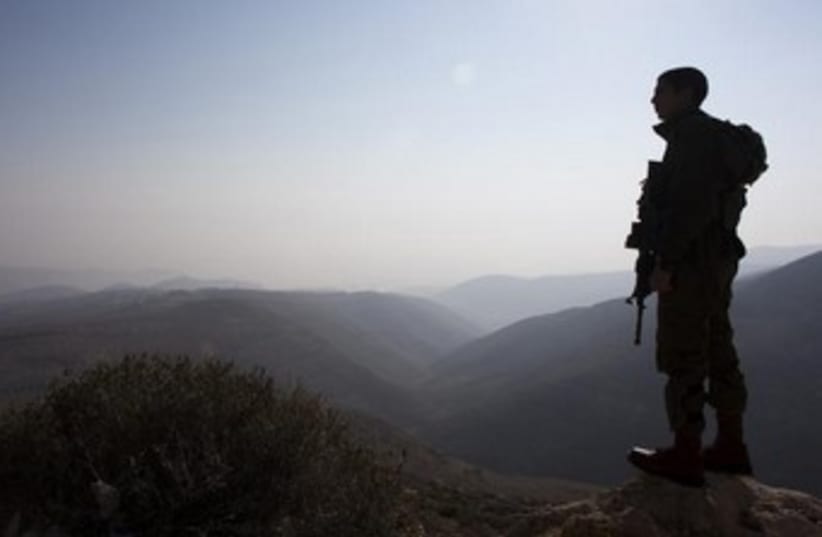In recent months, views have been aired to the effect that giving up the Jordan Valley will not impact Israel’s security. Others have argued that giving up the Jordan Valley will greatly impact Israel’s security.Unfortunately, none of these opinions have been supported by reason.Indeed, as a general rule, in this era of “superficial media and public discourse,” sound arguments and logic are absent; instead we hear slogans and emotional outbursts from the school of media advisers.
There are important reasons why we must not relinquish our grip on the Jordan Valley. Furthermore, renouncing the Jordan Valley will result in a total and irreversible loss of confidence.First, surrendering our hold on the Jordan Valley will destroy one of the longitudinal axes that are essential to the State of Israel. This will preclude Israel’s ability to enforce a future demilitarized State of Palestine and expose Jordan to a Palestinian coup, as well as expose Israel to possible danger on its eastern front.Israel’s wartime strategy is based on “interior lines.” Israel doesn’t fortify or permanently position a given command on a given front, but rather sends command units to wherever they’re needed, as they’re needed.This strategy derives from the relatively limited budgets and small number of personnel that serve in the regular and reserve forces. Strengthening the command in a given area – for defensive or offensive purposes – demands troop repositioning along Israel’s longitudinal axes: the coastal plain and the Jordan Valley. Relinquishing the Jordan Valley axis means forfeiting a crucial longitudinal axis; especially so in light of the relative ease of preventing the passage of forces along the coastal plain axis.Moreover, new guerrilla warfare techniques have been adopted by many countries, and also from time to time by the Palestinians. The prevalence of guerrilla warfare has magnified the importance of strategic territory and penetration. Today, in an age of missiles, there is no possibility of arguing in favor of giving up land.This lesson was learned firsthand in the Second Lebanon War, given the difficulty of hitting Hezbollah targets in a war run by guerrilla tactics.With relative ease, Palestinians could adopt such tactics and attack the Netanya area, preventing the movement of forces between the North and South of the country.Countering guerrillas “closing off” the Netanya area would require the deployment of forces in populated areas in the country’s narrow Center; a complicated and lengthy process. In such a scenario, it is likely that northern Israel would be disconnected from the South for a long and valuable time.Guerrilla warfare is very effective.Guerrilla forces tend to employ weapons that are difficult to identify in real time, which means a Palestinian guerrilla movement, established in Palestine, might only be discovered after it’s too late. Moreover, one assumes that even if Israel were to discover ammunition caches during a time of relative calm, it wouldn’t attack them, just as it is currently refraining from attacking the Gaza Strip – which is armed at all times.WITHOUT AN Israeli grip on the Jordan Valley, Jordan would be exposed to a Palestinian takeover; in certain circumstances, guerrilla forces could enter Jordan to help bring down the king. Moreover, since Hamas today holds a majority of the Palestinian Authority, one can predict that following a coup in Jordan, the new government will be influenced by Hamas, perhaps by Iran – but certainly not by King Abdullah.Thus I believe that King Abdullah, in his heart of hearts, prefers that Israel retain control over the Jordan Valley.Some experts are resolved that the eastern front has “expired” forever. To which I say that recently, we have seen that the Middle East is the most fluid place in the world, geopolitically speaking. Al-Qaida forces are positioned in Iraq and Syria, as well as Iran. Indeed, Syria and Iraq may ultimately be dominated by either of these two entities. Should this happen, King Abdullah’s rule will be compromised, and Jordan may join the “axis” countries – Iran, Iraq and Syria.In other words, the eastern front is closer than ever before.While facing such threats from the eastern front, if we do not sit tight in the Jordan Valley, Israel’s strategic depth, secured during war, cannot adequately provide for Israel’s protection.Iran will take note, and take aim at Tel Aviv.To the “experts” who argue that in peacetime, everything changes, I quote a diplomatic authority who said, “In times of peace, prepare for war.”Without Israel’s foothold in the Jordan Valley, we cannot defend Israel – and therefore there cannot be peace.The writer is a retired IDF general and former president of the Manufacturers Association of Israel.Loss of the Jordan Valley equals loss of security
To the “experts” who argue that in peacetime, everything changes, I quote a diplomatic authority who said, “In times of peace, prepare for war.”
